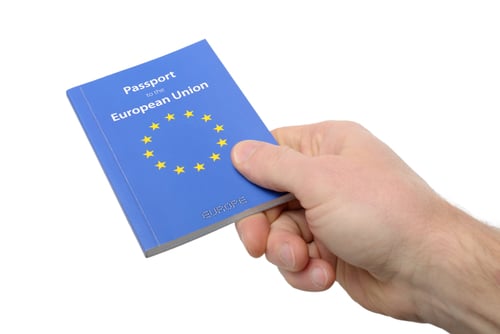That is exactly what the European Commission will be asked to consider if a citizen’s initiative can garner one million signatures from across Europe.
The “Choose Freedom” EU passport campaign was launched this week with the support of Brits living across Europe.

Glyn Hughes, a 57-year-old engineering designer from Derbyshire, came up with the initiative.
Sue Wilson, the chair of Bremain in Spain which campaigns for the UK to remain in the European Union and to protect the rights of British migrants living and working in Spain, is one of the co-signatories who presented the EU citizen’s initiative.
“There have been various schemes created in a bid to get EU citizenship but it’s complicated because the EU is not itself a nation state so can’t offer citizenship,” Wilson, who moved to Alcocebre in the province of Castellon with her husband a decade ago, told The Local.
“To get the rules changed would need another treaty. But the EU Commission does have the power to issue passports so our initiative is a way of achieving the same thing within rules that already exist.”
The proposal was accepted by the EU Commission as valid this week and now needs one million signatures in support over the next year in order to be presented for debate at the European Parliament.
“With 500 million EU citizens across 28 states, we have a lot to play with,” she said adding that any citizen can vote although there were exceptions against UK and Irish citizens residing in five countries, including France and Portugal, because of the voting laws of those countries.
Brexit brings an uncertain fate to the estimated two million Britons who currently reside in EU-member states – and the three million EU nationals living in the UK – and the conditions in which they will be allowed to stay in their adopted homelands is up for negotiation once the British government trigger Article 50.
On Tuesday, Brexit Secretary David Davis told Sweden's EU affairs and trade minister Ann Linde that securing the rights of Brits living in EU nations is a priority for the UK government in its forthcoming negotiations over leaving the union.
UK and Sweden agree 'everybody should be able to stay' after Brexit: EU minister https://t.co/Knxrn7ip6i pic.twitter.com/6ysjBLjMaN
— The Local Sweden (@TheLocalSweden) February 14, 2017
“We are determined to get a good outcome for EU citizens in Britain and Brits in the EU, to protect the rights of British citizens and EU nation citizens and get an answer quickly,” he told the media at the Swedish Foreign Ministry’s office in central Stockholm.
“We would have liked to have an answer already, but it will be the very first thing on the negotiation agenda once they start. We understand people feel uncertain,” he added.
Brits in Spain are mounting campaigns to make sure their voices are heard.
“Whatever the result of the Choose Freedom campaign,” explained Wilson. “I hope – at the very least – that it will prove to all European governments how strongly we value our EU citizenship, and the lengths to which we are prepared to go to hold onto those rights and freedoms.”
For more information about the Choose Freedom campaign and to cast your vote, visit the Bremain in Spain website.




 Please whitelist us to continue reading.
Please whitelist us to continue reading.
Member comments